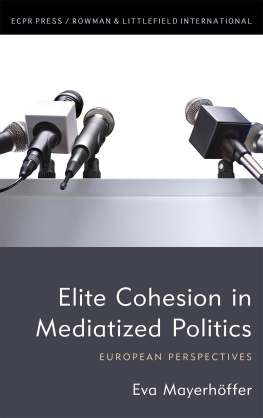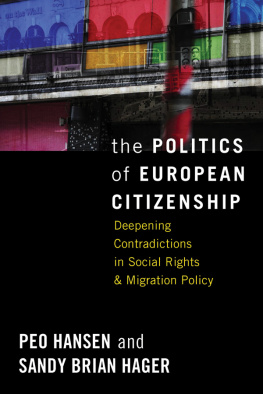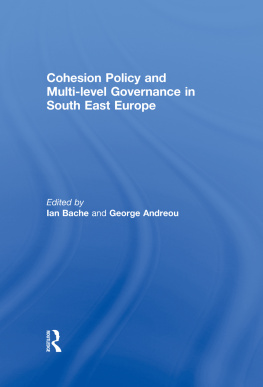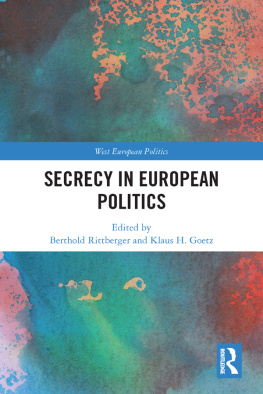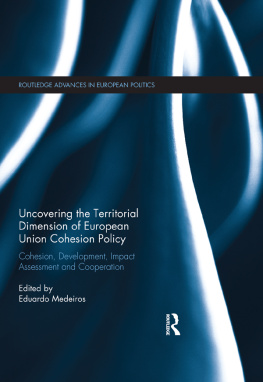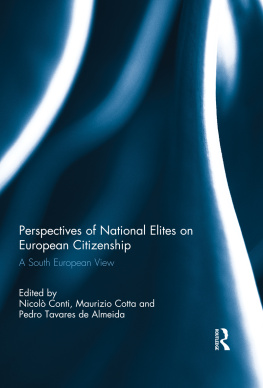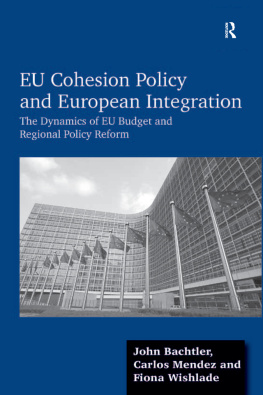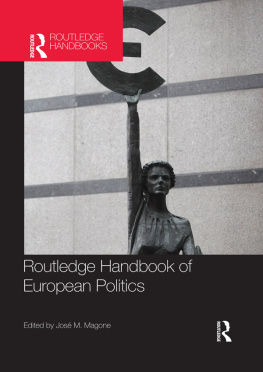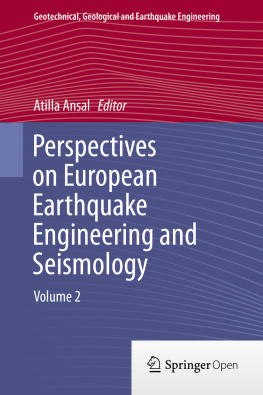Elite Cohesion in Mediatized Politics
ECPR Press
ECPR Press is an imprint of the European Consortium for Political Research in partnership with Rowman & Littlefield International. It publishes original research from leading political scientists and the best among early career researchers in the discipline. Its scope extends to all fields of political science, international relations and political thought, without restriction in either approach or regional focus. It is also open to interdisciplinary work with a predominant political dimension.
ECPR Press Editors
Editors
Ian OFlynn is Senior Lecturer in Political Theory at Newcastle University, UK.
Laura Sudulich is Senior Lecturer in Politics and International Relations at the University of Kent, UK. She is also affiliated to Cevipol (Centre dtude de la vie Politique) at the Universit libre de Bruxelles, Belgium.
Associate Editors
Andrew Glencross is Senior Lecturer in the Department of Politics and International Relations at Aston University, UK.
Liam Weeks is Lecturer in the Department of Government and Politics, University College Cork, Ireland, and Honorary Senior Research Fellow, Department of Politics and International Relations, Macquarie University, Australia .
Elite Cohesion in Mediatized Politics
European Perspectives
Eva Mayerhffer
Published by Rowman & Littlefield International Ltd.
6 Tinworth Street, London SE11 5AL, United Kingdom
www.rowmaninternational.com
In partnership with the European Consortium for Political Research, Harbour House, 68 Hythe Quay, Colchester, CO2 8JF, United Kingdom
Rowman & Littlefield International Ltd. is an affiliate of Rowman & Littlefield
4501 Forbes Boulevard, Suite 200, Lanham, Maryland 20706, USA
With additional offices in Boulder, New York, Toronto (Canada) and Plymouth (UK)
www.rowman.com
Copyright Eva Mayerhffer, 2019
This work is a revised version of a dissertation submitted to the Freie Universitt Berlin (D188)
All rights reserved . No part of this book may be reproduced in any form or by any electronic or mechanical means, including information storage and retrieval systems, without written permission from the publisher, except by a reviewer who may quote passages in a review.
British Library Cataloguing in Publication Data
A catalogue record for this book is available from the British Library
ISBN: HB 978-1-7855-2284-0
Library of Congress Cataloging-in-Publication Data Is Available
978-1-78552-284-0 (cloth: alk. paper)
978-1-78552-285-7 (electronic)

The paper used in this publication meets the minimum requirements of American National Standard for Information Sciences Permanence of Paper for Printed Library Materials, ANSI/NISO Z39.481992.
Printed in the United States of America
Contents
Figures and Tables
FIGURES
1.1Country Selection
3.1Modelling Elite Cohesion in Political Communication
3.2Patterns of Inter-Sectoral Cohesion
3.3Patterns of Intra-Sectoral Cohesion
5.1Inter-Sectoral Cohesion from North to South
5.2Ideology Patterns and Sources of Cohesion
5.3Publicity Patterns and Sources of Cohesion
5.4Legitimacy of Disclosure (Sector Means by Country)
5.5Pragmatism Patterns and Sources of Cohesion
6.1Relative Weight of Sources of Cohesion by Country and Sector
6.2Patterns of Internal Cohesion in the Media and Political Sector
7.1Separability Scores (Wilks Lambda) Sector versus Ideology and Generation
TABLES
4.1Systemic Characteristics by Country
4.2Context of Elite Cohesion in Political Communication
4.3Sample of Media Organizations
4.4Sample of Elite Positions within Political Organizations
6.1Cohesion in the Media Sector versus Political Sector
7.1Frequency and Quality of Interaction (OLS Regression)
A.1Cohesion Indicators by Guiding Principles and Sources
A.2Number of Contacted Persons, Respondents, Response Rates, Field Period and Interview Modes
A.3Demographic and Professional Background of Surveyed Media and Political Elites
A.4Inter-Sectoral Cohesion: Patterns, Dispersion Scores, Discriminance Scores and Means (Media Elites [M]/Political Elites [P])
A.5Intra-Sectoral Cohesion Internal Congruence and Role Specialization (Proximity Scores, Group Means and Patterns)
Chapter 1
Introduction
REDISCOVERING ELITES
In one way or another, society has always been divided into two basic groups: the elite and the general population. Having fallen somewhat out of view, this fact has once again become a subject of intense concern and debate. Extreme concentration of wealth, technocratic politics of necessity and not least a surge of populist parties and movements across the Western hemisphere have made elites one of the most pertinent issues in public and academic debate. This book takes a particular approach to this issue. For one, it deals with a relatively new type of elite that has remained somewhat below the radar, even though it plays an increasingly crucial part in a society permeated by informational flows and media technology: the political communication elite . Secondly, the book moves beyond the questions of who (are the members of elite) and how much (money, fame or decision-making power do they have) to the question of elite cohesion .
First, a few words on the political communication elite. The political communication elite draws together members of the political elite and the media elite in the creation and dissemination of political messages and news presented to the public. As such, the political communication elite is composed of two groups that could hardly be more different in terms of traditional elite status: whereas high-ranking politicians in many ways constitute the quintessential elite, at least insofar as political office still comes with unique resources, means and power, journalists and editors have traditionally been seen, and to some extent seen themselves, as non-elites or even anti-elites. This image is, however, no longer viable. In a society where influence on opinion formation and control over the form and content of the public debate are rivalling material and coercive resources, high-ranking journalists and editors have joined politicians and communication experts in the new elite configuration of the political communication elite.
This is not to say that journalists and editors have simply become part of the political elite in terms of their institutional position or overall logic of action. Rather, media elites have joined business elites, scientific elites, religious elites and other elites who may have significant impact on the process of political decision making from their position within their particular sector of society. Just as other sectoral elites have long been recognized as having potential influence on politics, high-ranking journalists and editors have become persons who are able, by virtue of their strategic positions in powerful organizations and movements, to affect political outcomes regularly and substantially (Higley and Burton 2006), or simply persons who possess resources that grant them power and influence in society (Etzioni-Halevy 1993, 95). Indeed, high-ranking media actors have privileged access to an increasingly scarce resource: public attention, opinion and acceptance in political decision making.

 The paper used in this publication meets the minimum requirements of American National Standard for Information Sciences Permanence of Paper for Printed Library Materials, ANSI/NISO Z39.481992.
The paper used in this publication meets the minimum requirements of American National Standard for Information Sciences Permanence of Paper for Printed Library Materials, ANSI/NISO Z39.481992.
